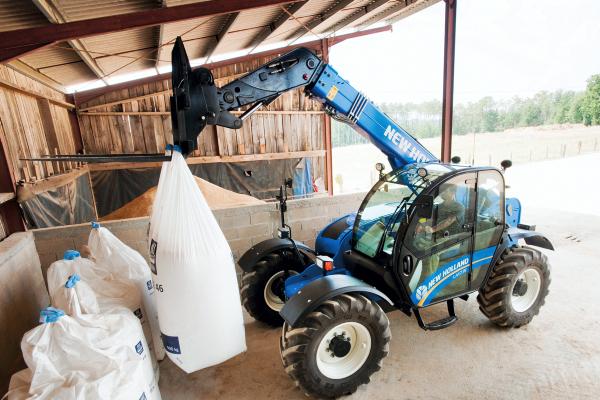New Holland has redesigned its heavy-duty six to nine metre LM range of telehandlers to give better loading performance and operator comfort.
The new five model range features the LM 6.32, LM 6.35 Elite, LM 7.35, LM 7.42 Elite and LM 9.35 models. These machines can lift up to 4,200kg and have a maximum lift height of 9.1 metres.
These new telehandlers replace the existing LM5040, LM5060 and LM5080 models. There is new machine numbering where the first digit indicates the maximum lift height in metres, and the second two numbers denote the maximum lift capacity in hundreds of kilogrammes.
All models in the new LM range are powered by the NEF engine which uses SCR AdBlue system for Stage IIIB/Tier 4A compliance. New Holland claims that these engines give improved machine performance and better fuel economy than the current LM models.
Standard LM machines develop up to 121hp, which rises to 143hp on the Elite models. This power level enables maximum lift heights of 6.1 metres on LM6.32, 7.0 metres on LM7.35 and 9.1 metres on LM9.35 models to be reached.
The lifting boom on the new machines is made from high tensile steel. New Holland claims to use larger pins and pads to give better durability.
The biggest model in the range, the LM9.35, has been developed with modern straw-focused operations in mind, which need to accurately stack bales in the tallest modern sheds.
The new LM range offers lift capacities from 3,200kg right through to 4,200kg. The Elite models have bigger lifting capacities. The LM6.35 Elite can lift 3,500kg, 300kg more than the standard model, and the LM7.42 Elite can lift up to 4,200kg, 20% more than the standard machine. The 131° of tilt on standard models, which rises to 142° on Elite models, should ensure that even the stickiest of buckets are fully emptied.
It is claimed that the boost in the hydraulic power to 120 litres per minute and 140 litres in the Elite models will bring improved machine cycle times.
There was a lot of focus on improving the comfort levels. The cab has been upgraded with more glass for better visibility and it’s quieter.
All key controls have been grouped together and all principal boom functions are controlled via a finger-tip electronic joystick together with gear shifting and neutral engagement.
On Elite models, the joystick has been positioned on the armrest, and features additional forward and reverse controls.
The 4x3 powershift transmission has been tweaked on the standard models. The Elite models get a 6x3 powershift transmission with auto shifting functionality.
Operators manually change through gears one to four, and auto-shifting engages to automatically select gears five and six to ensure the most efficient gear is always selected.
It is claimed that this feature will improve operator comfort and reduce fuel consumption during road transport at a maximum of 40km/hr.
The chassis has been stiffened to reduce flexing during delicate handling tasks. It is claimed that the new integrated oil tank improves balance for working on silage clamps.
The front boom attachment has been upgraded to make it compatible with a wider range of implements and make hitching up faster.
Elite models also feature automatic steering alignment. This is designed to ensure that all four wheels are aligned to enhance steering accuracy and to reduce tyre wear.
From a service point of view, the new LM range has what New Holland call an under-hood configuration to make daily maintenance simple and tool free. All service points can be reached from ground level. The engine is fitted with a reversible fan to keep grills free of debris.
The makers claim to have simplified the time-consuming job of adjusting the telescopic longer-life boom wear pads. With this new telehandler, a simple screw and lock nut system makes adjustment quick and easy, and without the need for special tools, according to New Holland.






 This is a subscriber-only article
This is a subscriber-only article











SHARING OPTIONS: